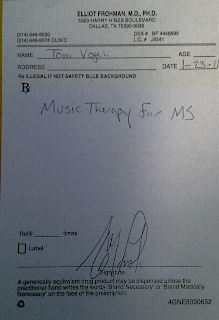This prescription represents a big step toward bringing awareness of music therapy options to doctors, patients, and organizations like the MS Society and their support groups. Toni hopes that she can pave the way for other MS patients interested in using music to better their condition, and we're thinking she will be quite successful.
Music as therapy is a growing field that according to the American Music Therapy Association is "the clinical and evidence-based use of music interventions to accomplish individualized goals within a therapeutic relationship..."
Friend of MusickEd Kimberly S. Moore (aka the Music Therapy Maven) tells me that music therapy "is typically divided into 4 'types' of music experiences: performing, composing, improvising, and listening with learning being a part of performing. In simpler terms: playing, writing, improvising, and listening."
-we all know that music holds special powers...
Music therapies can be designed to promote wellness, manage stress, alleviate pain, express feelings, enhance memory, improve communication, and promote physical rehabilitation. Research in music therapy supports its effectiveness in a wide variety of health-care and educational settings. Check out this video from our friend Rachel Rambach a certified music therapist on how she uses music as therapy in her home studio. Her original songs have helped autistic children more easily communicate, both in and out of the studio.
We've experienced first-hand the power of music via lessons on campus at DSM and again with Kore Series users online. In the past 20 years we have seen music and music education; play a vital role in the recovery process from traumatic injuries, used in the maintenance of debilitating diseases such as MS, and even prescribed to help ease the effects of asthma.
Interestingly enough, many of our "healthy" students admit that time spent 'musicking' is the highlight of their week and a welcome reprieve from life's daily challenges. But we're preaching to the choir I'm sure - we all know that music holds special powers, that's why we're here!


